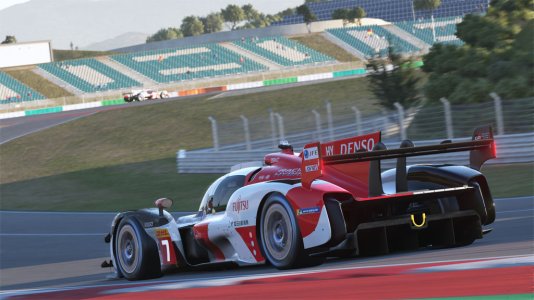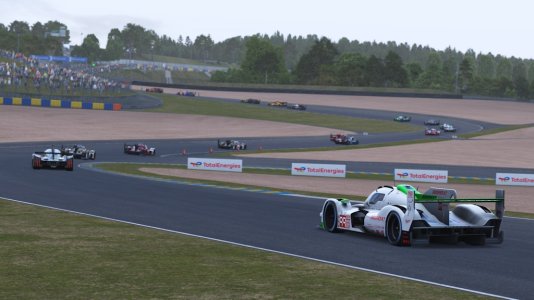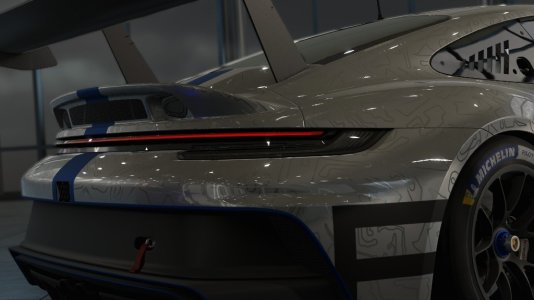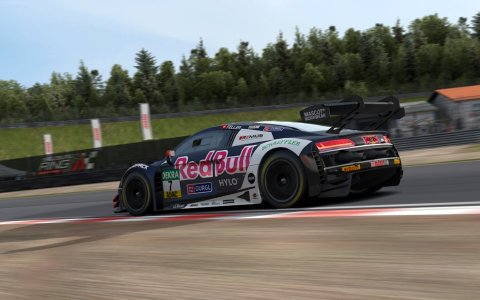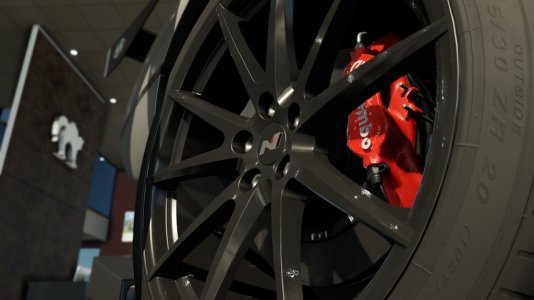You are using an out of date browser. It may not display this or other websites correctly.
You should upgrade or use an alternative browser.
You should upgrade or use an alternative browser.
JGTC/Super GT.
- Thread starter MrRacer11
- Start date
There are plenty of extra cars and skins available but i think the mod was pulled from many sites when the creator became irate that many were "ripping off my mod". A couple of years ago someone was working on "repacking" the mod but I don't know how far they got (they ran into permissions issues also) ...but this may be a place to start the search - https://gtr2-endurance.forumotion.org/t5261-jgtc-supergt-repack
I have noticed that when installing many mods, for some reason GTR2 takes a little longer to load. I did read a post/thread which stated to use Process Lasso to enable GTR2 to use all of your CPU's cores. Would this actually help?There are plenty of extra cars and skins available but i think the mod was pulled from many sites when the creator became irate that many were "ripping off my mod". A couple of years ago someone was working on "repacking" the mod but I don't know how far they got (they ran into permissions issues also) ...but this may be a place to start the search - https://gtr2-endurance.forumotion.org/t5261-jgtc-supergt-repack
Jempy
Premium
I doubt that those Process managers ( Lasso or Bill2's or ??? ) might help in this case.
I always use a Process Manager, have a very modded and very heavy install on a SSHD ... and one thing I'm now sure of, nearly only the use of a SSD helps to have GTR2 loading quickly.
How do I take this conclusion:
- As all my sims are installed on this SSHD, all of them use the SS part to load. This SS part is not very huge, so each time you load another Sim ... this one will be the one that will be used the next time for this sim .... so that the previous used sim will not keep its load advantage
- the difference between a 1st GTR2 launch in this case is huge compared to the next time you will use it ( without having launched another sim ) ..... more than 2 minutes and the next time: 30 seconds ... so +- 4times quicker
- I have another install ( a bit less heavy ) on a 256GB SSD ( the one I used for OS and softwares in my previous PC ) and GTR2 always loads very quickly on this one. Using the affinity settings included in the Crew Chief plugin but without it .... GTR2 loads as quickly as with it.
EDIT: the best solution is ... make a less heavy install by using a Mod Manager as JSGME or OVGME.... just activate the mod or mods you're using regularly at a precise time ....and unactivate the ones you just used and will not use for sure the next times.
This takes place on the disk but the game loads quicker.
I always use a Process Manager, have a very modded and very heavy install on a SSHD ... and one thing I'm now sure of, nearly only the use of a SSD helps to have GTR2 loading quickly.
How do I take this conclusion:
- As all my sims are installed on this SSHD, all of them use the SS part to load. This SS part is not very huge, so each time you load another Sim ... this one will be the one that will be used the next time for this sim .... so that the previous used sim will not keep its load advantage
- the difference between a 1st GTR2 launch in this case is huge compared to the next time you will use it ( without having launched another sim ) ..... more than 2 minutes and the next time: 30 seconds ... so +- 4times quicker
- I have another install ( a bit less heavy ) on a 256GB SSD ( the one I used for OS and softwares in my previous PC ) and GTR2 always loads very quickly on this one. Using the affinity settings included in the Crew Chief plugin but without it .... GTR2 loads as quickly as with it.
EDIT: the best solution is ... make a less heavy install by using a Mod Manager as JSGME or OVGME.... just activate the mod or mods you're using regularly at a precise time ....and unactivate the ones you just used and will not use for sure the next times.
This takes place on the disk but the game loads quicker.
Last edited:
How do I go about using JSGME. It seems a bit complicated. I'm going to hopefully build a new gaming pc. I'm probably going to get a 1TB or 2TB SSD for games and things. I was considering having a 6TB Seagate Barracuda 3.5'' HDD for games as well. But I'm not sure what is best, a normal mechanical HDD or an SSD.I doubt that those Process managers ( Lasso or Bill2's or ??? ) might help in this case.
I always use a Process Manager, have a very modded and very heavy install on a SSHD ... and one thing I'm now sure of, nearly only the use of a SSD helps to have GTR2 loading quickly.
How do I take this conclusion:
- As all my sims are installed on this SSHD, all of them use the SS part to load. This SS part is not very huge, so each time you load another Sim ... this one will be the one that will be used the next time for this sim .... so that the previous used sim will not keep its load advantage
- the difference between a 1st GTR2 launch in this case is huge compared to the next time you will use it ( without having launched another sim ) ..... more than 2 minutes and the next time: 30 seconds ... so +- 4times quicker
- I have another install ( a bit less heavy ) on a 256GB SSD ( the one I used for OS and softwares in my previous PC ) and GTR2 always loads very quickly on this one. Using the affinity settings included in the Crew Chief plugin but without it .... GTR2 loads as quickly as with it.
EDIT: the best solution is ... make a less heavy install by using a Mod Manager as JSGME or OVGME.... just activate the mod or mods you're using regularly at a precise time ....and unactivate the ones you just used and will not use for sure the next times.
This takes place on the disk but the game loads quicker.
Jempy
Premium
I have a similar hesitation .... this 2TO SSHD Seagate is now 8 years old ... while the PC itself is only 2 1/2 year old. .... I'm sure now that I won't buy a new SSHD as it should be mostly interesting only for those who nearly always use the same heavy software ... and moreover that's just a compromise between SSD and HDD ( but maybe a bit more fragile even though I was lucky with mine ).
Bigger SSD ( as 2TO for example ) are cheaper nowadays but do they really have an advantage for sim games except on startup ?... not sure at all first and moreover what about the real limit of writing on those new SSD ( much better than before for sure but ???? ) as games and documents should be on it.
I nearly came to the conclusion I'd surely do this: ( above more RAM )
- keep my 2 1/2 years old NVME 500GB as it is for OS and usual software ( +Appdata as I never found if it is possible or not to have them outside the main C:/ disk )
- replace the SSHD by an usual 2TO HDD for Documents and storage ( modding takes much place )
)
- replace the still used previous 250 GB SSD by a 1TO new one for all finished games ( while the still often updated ones should remain on HDD ) ... as mostly most datas are written in Documents.
This should help for a quicker startup of all games. ( GTR2 should however be in this SSD ).
NB: JSGME is really easy to use once you know how it works .... but don't forget that mods are taking 2 times more place on disk for activated mods ( + a bit space for the possible modifications saves when activating a mod )
Bigger SSD ( as 2TO for example ) are cheaper nowadays but do they really have an advantage for sim games except on startup ?... not sure at all first and moreover what about the real limit of writing on those new SSD ( much better than before for sure but ???? ) as games and documents should be on it.
I nearly came to the conclusion I'd surely do this: ( above more RAM )
- keep my 2 1/2 years old NVME 500GB as it is for OS and usual software ( +Appdata as I never found if it is possible or not to have them outside the main C:/ disk )
- replace the SSHD by an usual 2TO HDD for Documents and storage ( modding takes much place
- replace the still used previous 250 GB SSD by a 1TO new one for all finished games ( while the still often updated ones should remain on HDD ) ... as mostly most datas are written in Documents.
This should help for a quicker startup of all games. ( GTR2 should however be in this SSD ).
NB: JSGME is really easy to use once you know how it works .... but don't forget that mods are taking 2 times more place on disk for activated mods ( + a bit space for the possible modifications saves when activating a mod )
Last edited:
Peppelino
Race Remaster fan
As always, good thinking, here...
My good memories about SSD disks,
is this... fantastic !! The absolutely
Best investment I've done so far
hardwarewise.. Having twelve
systems, all have SSDs.(Samsung).
My Macs not included... (Intel 530)
Buying a couple, every month, for
upgrading customer's old comps.
Most importantly... Not one single
disc error in over ten years !
Rotating hybrids ?!
Sorry, not recommended..
Seen that, being in the repair-
business for years.
My good memories about SSD disks,
is this... fantastic !! The absolutely
Best investment I've done so far
hardwarewise.. Having twelve
systems, all have SSDs.(Samsung).
My Macs not included... (Intel 530)
Buying a couple, every month, for
upgrading customer's old comps.
Most importantly... Not one single
disc error in over ten years !
Rotating hybrids ?!
Sorry, not recommended..
Seen that, being in the repair-
business for years.
The more mods and tracks you have installed the longer GTR2 takes to load; I believe because it loads certain files for every car, talent, track, etc. before displaying menus. My GTR2 takes about two minutes to fully load, my P&G install is less than half the size and loads in about thirty seconds. Faster SSD/HD and/or faster RAM would help, but the best thing is pruning out mods and tracks you no longer use, or creating a second/third install (the latter is a good solution as you can then tweak each install for a specific type of car/mod).
FWIW, Process Lasso is quite useful if your system resources are near the limit when running some programs. It will not make your system any faster, it will make it more stable and eliminate most, if not all, stutters. All it does is monitor everything running in the background and allocate minimal resources to anything that needs to run right then and pause anything that doesn't need to run until you've closed the foreground program.
For example, MS FlightSim is prone to "micro-stutters" - a fraction of a second pause when anything in the background interrupts scenery loading; Process Lasso eliminated these stutters completely, no better frame rate just smoother performance.
The full version has a gaming mode which acts more aggressively, and any program can be run in this mode; I ran my browser with it and it definitely made a difference.
For example, MS FlightSim is prone to "micro-stutters" - a fraction of a second pause when anything in the background interrupts scenery loading; Process Lasso eliminated these stutters completely, no better frame rate just smoother performance.
The full version has a gaming mode which acts more aggressively, and any program can be run in this mode; I ran my browser with it and it definitely made a difference.
Thanks for the advice all. I used the GTR2 4GB patch and I have set Process Lasso for the GTR2.exe. I have noticed an increase in the boot time of the game.
Yes maybe several GTR2 installations would also be a way to go forward. I actually did this before, I had like 2/3 GTR2 installations. One vanilla, and two modded versions. I'll probably do that again.
As for SSD's I was once told that SSD's have a higher failure rate than a traditional normal HDD. I have no idea if that's true. At the moment my GTR2 install is on a 2TB Seagate Barracuda HDD, which makes a rather strange sound when I boot my pc up, bear in mind that the 2TB Seagate HDD is not the drive with Windows on. It is a secondary HDD. I just thought that maybe it is just the normal operating sounds of the HDD that I am hearing.
Does anyone have any further advice on this? Should I just replace the HDD?
Yes maybe several GTR2 installations would also be a way to go forward. I actually did this before, I had like 2/3 GTR2 installations. One vanilla, and two modded versions. I'll probably do that again.
As for SSD's I was once told that SSD's have a higher failure rate than a traditional normal HDD. I have no idea if that's true. At the moment my GTR2 install is on a 2TB Seagate Barracuda HDD, which makes a rather strange sound when I boot my pc up, bear in mind that the 2TB Seagate HDD is not the drive with Windows on. It is a secondary HDD. I just thought that maybe it is just the normal operating sounds of the HDD that I am hearing.
Does anyone have any further advice on this? Should I just replace the HDD?
With normal wear and tear an HD will outlast an SSD, but the speed of the SSD makes up for that; so go with the standard of an SSD for programs and an HD for storage. And keep good backups. Modern SSDs are much better than first generation but still haven't the longevity of HDs
A program such as Hard Disk Sentinel will keep you appraised of the general condition of the drive, works for SSD and HD. For a quick test, open a command prompt and enter - wmic diskdrive get model,status - if windows is satisfied with the condition of the drives you will get "OK" for each one found.
A noisy HD, particularly a grinding or rattling sound, is often indicative of imminent failure, but not always. I would back up the data and keep using it (I have an old XP system whose HD, now 19 years old, makes a loud whirring that is audible throughout my apartment, but it still passes all tests and works fine; at the other extreme I've had a new drive fail while formatting it). But HDs are dirt cheap today....
If you are comfortable with symbolic links you can make optimal use of an SSD/HD combination for games. For example, install a race sim on the SSD for fast access but move the data folders (cars, sounds, tracks, etc., which take the most space) to the HD and create symbolic links to them. Now only the program is on the SSD while all the space hungry files are on the HD, but the program thinks they are right there with it. (You can also use this to link multiple copies of a sim to a common track folder.)
A program such as Hard Disk Sentinel will keep you appraised of the general condition of the drive, works for SSD and HD. For a quick test, open a command prompt and enter - wmic diskdrive get model,status - if windows is satisfied with the condition of the drives you will get "OK" for each one found.
A noisy HD, particularly a grinding or rattling sound, is often indicative of imminent failure, but not always. I would back up the data and keep using it (I have an old XP system whose HD, now 19 years old, makes a loud whirring that is audible throughout my apartment, but it still passes all tests and works fine; at the other extreme I've had a new drive fail while formatting it). But HDs are dirt cheap today....
If you are comfortable with symbolic links you can make optimal use of an SSD/HD combination for games. For example, install a race sim on the SSD for fast access but move the data folders (cars, sounds, tracks, etc., which take the most space) to the HD and create symbolic links to them. Now only the program is on the SSD while all the space hungry files are on the HD, but the program thinks they are right there with it. (You can also use this to link multiple copies of a sim to a common track folder.)
Thank you for the help. I wouldn't say it's noisy. It's just that the 2TB Seagate Barracuda HDD sometimes makes noises when my system is idle. I have noticed, particularly when I open up the HDD to select a game to play I will hear a kind of low click.With normal wear and tear an HD will outlast an SSD, but the speed of the SSD makes up for that; so go with the standard of an SSD for programs and an HD for storage. And keep good backups. Modern SSDs are much better than first generation but still haven't the longevity of HDs
A program such as Hard Disk Sentinel will keep you appraised of the general condition of the drive, works for SSD and HD. For a quick test, open a command prompt and enter - wmic diskdrive get model,status - if windows is satisfied with the condition of the drives you will get "OK" for each one found.
A noisy HD, particularly a grinding or rattling sound, is often indicative of imminent failure, but not always. I would back up the data and keep using it (I have an old XP system whose HD, now 19 years old, makes a loud whirring that is audible throughout my apartment, but it still passes all tests and works fine; at the other extreme I've had a new drive fail while formatting it). But HDs are dirt cheap today....
If you are comfortable with symbolic links you can make optimal use of an SSD/HD combination for games. For example, install a race sim on the SSD for fast access but move the data folders (cars, sounds, tracks, etc., which take the most space) to the HD and create symbolic links to them. Now only the program is on the SSD while all the space hungry files are on the HD, but the program thinks they are right there with it. (You can also use this to link multiple copies of a sim to a common track folder.)
Is that indicative of a problem do you think? Or is it just the way the HDD is accessing the data.
Windows is constantly accessing the HD, a single click or tick is usually just the arm holding the heads returning to its rest position. Continuous noises are cause for worry. A small sound when first accessing, especially after a period of inactivity, is the disc coming up to speed; depending on drive and system, after a time of no access the disc may entirely power down or may go into a low power mode with disc spinning slowly, so basically you hear it "waking up". All this varies greatly with manufacturer, rpm, capacity, and design.
Latest News
-
List Of Licensed Sim Racing Steering WheelsFrom 1:1 scale GT wheels to Formula One replicas, the world of licensed wheel rims in sim racing...
- Connor Minniss
- Updated:
- 5 min read
-
WATCH: What's new with BavarianSimTec?The high-end sim racing hardware market continues to grow, and one of the most advanced...
- Yannik Haustein
- Updated:
- 1 min read
-
Short Track Racing In West Germany: Meet Gelsenkirchen's Almaring for Assetto CorsaWho doesn't love obscure track mods? The Almaring in Gelsenkirchen for Assetto Corsa is firmly...
- Yannik Haustein
- Updated:
- 3 min read
-
The Infamous Iowa Speedway Debuts With Style In Assetto CorsaWho's up for some short oval action? Iowa Speedway is now available as an Assetto Corsa mod...
- Connor Minniss
- Updated:
- 4 min read
-
Community Letter: A Few Changes On The Front PageStanding still is moving backwards, and of course OverTake wants to push forward. To do so, we...
- Christopher E
- Updated:
- 3 min read
-
Impressive Detail: First Senna Netflix Series Trailer Is HereAfter a teaser in April of 2024, the first trailer for the Senna Netflix series is here and...
- Yannik Haustein
- Updated:
- 4 min read
-
Stages, Rallycross, Performance: Why Our Community Still Prefers DiRT Rally 2.0 Over EA Sports WRCWithout a doubt, EA Sports WRC and DiRT Rally 2.0 are the two heavy hitters in modern rally...
- Connor Minniss
- Updated:
- 5 min read


